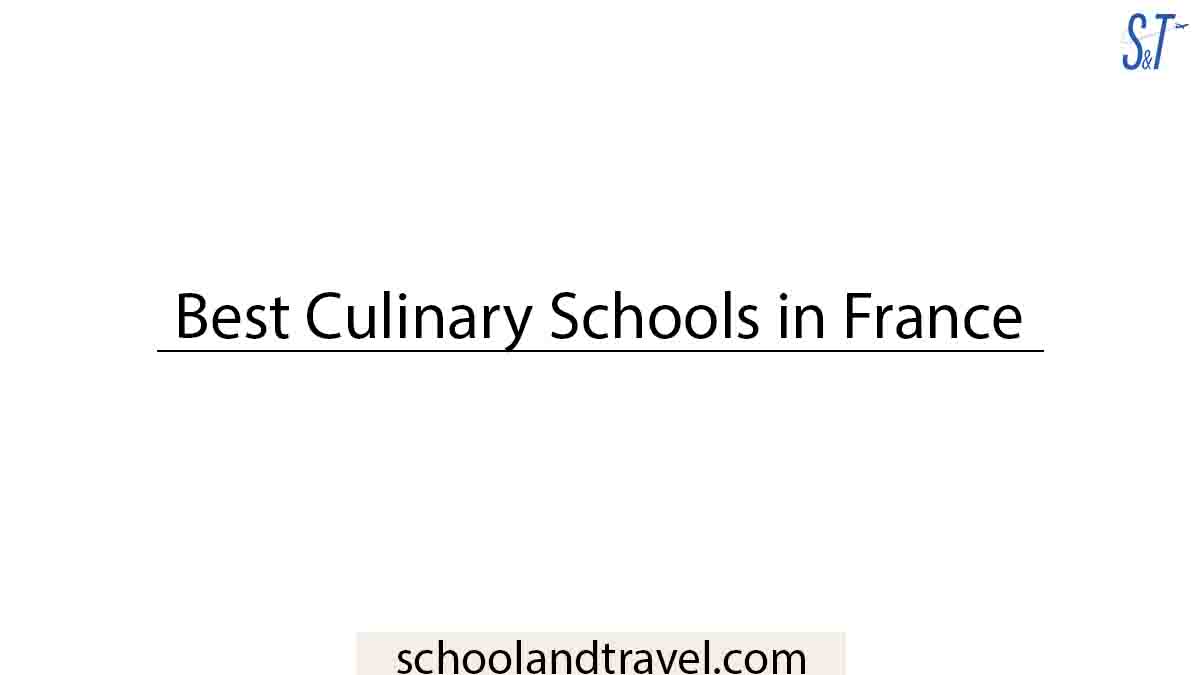The culinary schools in France offer great training in practicing and mastering cooking.
The schools have evolved over time, shaped by the diverse cultures of the countries surrounding them. There are numerous culinary schools in France for foreign students.
Students from around the world interested in studying culinary arts in France might consider applying to one of these establishments.
Western cuisines have benefited greatly from French cooking knowledge. Its criteria are frequently employed in Western culinary education and school boards.
Is France Good for Culinary Arts?
French cuisine is regarded as the best in the world in terms of prestige and respectability.
French cuisine has ruled the world with its formal skills, appreciation for fresh ingredients and basic flavors, pride in presentation, and rich and colorful history.
The World Culinary Awards have named France the greatest culinary training facility in the world, welcoming over 1000 students each year.
More so, throughout the ages, professional cooks in the country have been recognized as culinary experts. They are, without a doubt, some of the world’s top cooks.
Anyone working in the kitchens or waiting on tables in the République Française must be willing to put in the time and effort to learn the necessary skills.
How Long is the Culinary School in France?
It’s possible to develop your technical and creative talents as a chef by attending culinary schools in France.
Most culinary schools in France require students to complete their training in 14 to 18 months. It could take less time, or it could take longer than 18 months.
How to Become a Chef in France?
To become a chef in France, one must put in a significant amount of time and effort in terms of formal education and practical experience.
However, one must spend several years working as a chef before being considered a “chef” in this curriculum, which is akin to a vocational school.
To become a chef, even a sous-chef, one must pass all or most of these diplomas, starting with commis de cuisine, then chef de partie, and finally chef de cuisine, to reach the top of the food service hierarchy.
For public sector employment, aspiring chefs often need to complete additional training courses and pass competitive examinations to get recruited.
Chefs need to be excellent cooks, as well as excellent managers and organizers.
To obtain the “large toque,” a chef in France must have at least ten years of paid “apprenticeship” experience in the kitchen.
It takes a lot of hard work and determination to get there. Even though a toque is light in weight, it is seen as a symbol of hard work in French society. In France, wearing white hats and turbans is a serious concern.
Is France famous for Cooking?
French cuisine is characterized by its reliance on simple, natural taste combinations to produce memorable and appreciated worldwide dishes.
UNESCO recognized French food as part of the world’s intangible cultural heritage in 2010, a testament to how highly esteemed the cuisine is worldwide.
In France, techniques including flambéing, braising, poaching, and sautéing have been developed greatly.
Adding them to meats, veggies, and other foods provides a wonderful blast of flavor and texture. This type of chef is always looking for new ways to enhance the flavor of their food and isn’t hesitant to experiment.
Why do Chefs go to France?
As a result of their expertise in classical French cuisine, talented cooks may more easily play around with their dishes.
Most professional chefs encourage their staff to experiment in the kitchen to better serve their patrons and themselves.
They are constantly looking for novel recipes, methods, and ingredients. As a bonus, a common education in French techniques can make kitchen communication smoother and more efficient.
Top 7 Culinary (Cooking) Techniques in France:
1. Flambéing:
The term “flambe” refers to igniting alcoholic beverages or liqueurs. Foods are coated in the liqueur for dramatic effect and to develop the liqueur’s rich flavor without the addition of alcohol.
2. Sautéing:
Sautéing quickly cooks food in a small amount of fat at a high temperature. Food reaction to heat and the technique of throwing it into the pan is described by the French verb “sauter,” which means “to jump.”
3. Poaching:
Poaching is a low-temperature wet heat cooking technique that involves soaking food in a liquid and slowly heating it. Fish, chicken, and eggs, as well as several fruits and vegetables, can be cooked using this method.
4. Broiling:
Broiling is the direct exposure to radiant heat on a grill over live coals or underneath an electric coil.
Roasting and baking include cooking the food from the bottom up, while broiling involves cooking the food from the top down, one side at a time.
5. Grilling:
Grilling is cooking meals over an open flame using charcoal or other fuel. Cooking with direct heat creates a lovely and flavorful crust outside of food by quickly searing the surface.
6. Braising:
In braising, meat or vegetables are slowed-cooked with oil and water in a tightly enclosed pot.
Braise varies from stewing and covered roasting in that no liquid is added during the cooking process. While roasting is done undercover, braising involves steaming the food inside.
7. Baking:
Baking is cooking anything with dry heat, usually in an oven. It is most likely the oldest way of cooking.
Bakery items, such as bread, rolls, cookies, pies, pastries, and muffins, are typically made with flour or meal obtained from grains.
Read more: How to become a Self-taught Chef Without Culinary School
15 Culinary Schools in France | 2023
1. Le Cordon Bleu:
Le Cordon Bleu is one of the best culinary schools in Paris, France.
Michelin-starred and one of the best craftsmen in France chefs have worked with Le Cordon Bleu chefs in some of the world’s most esteemed restaurants (Un des Meilleurs Ouvriers de France – MOF).
Their knowledge and experience are shared with students daily, helping them understand the importance of hard effort and dynamism in reaching achievement.
If the tourism business is to continue expanding across the globe, workers in the food and beverage industry must be able to meet the demands of their customers.
Le Cordon Bleu has responded to the growing need for particular professional training by developing programs.
How long does Culinary school last in Le Cordon Bleu?
The short courses offered by Le Cordon Bleu cater to a wide range of interests, including cooking, pastry, bread, and wine. Training consists of either lectures or hands-on workshops.
The time it takes to finish this training varies from 7 months to 2 years, depending on the certification, with a median time of 2 years to complete.
How much does the Culinary school cost in Le Cordon Bleu?
It costs anything from $20,000 to $70,000 to attend Le Cordon Bleu College of Culinary Arts in Los Angeles, with a median cost of $41,000.
As the highest culinary credential offered by Le Cordon Bleu, the Grand Diplôme® encompasses both their Diplôme de Cuisine and our Diplôme de Pâtisserie programs.
An authorized professional chef diploma is conferred following a full-time course of study of nine months.
More so, most students who apply and complete the prerequisites are admitted to LCB (75-100 percent of those who apply are admitted).
As one of the best culinary schools in Paris, students are urged to apply early and wait until the deadline because each program has a restricted number of seats.
2. Les Coulisses du Chef:
To help its students or your workers succeed, this cooking school in France offers customized training suited to their specific needs.
Companies can either have them come to their location or have access to them through their Paris exchange workshop.
Their team of specialists utilizes their knowledge, skills, and resources to assist you in realizing your goals.
They will help you and train you with experts in the field of intervention experience who are well-regarded.
If they have a “DIF Fongecif” registration number, their training company is permitted to conduct culinary training that is eligible for financial support from that organization.
It is one of the best culinary schools in Paris.
3. ChefsSquare (formerly L’Atelier des Sens):
At the Atelier des Sens, Natacha Burtinovic started her business in 2004. As the name implies, this project aims to provide a setting in which expert chefs can impart their knowledge in a way that is accessible to the general public.
Atelier des Sens, a forerunner in the gourmet craze, is now a go-to source for the latest culinary fads. They are rebranding themselves as Chefsquare today.
For the past 16 years, the school and its leaders and students have evolved together. With more than a hundred different hats, his group can demonstrate a wide range of culinary styles to their audience.
The school required a new name to reflect its current offerings better.
Traditional culinary workshops and team-building, private lessons in restaurants, and modular professional training, geared toward the realities of today’s industry are all part of its curriculum.
It is one of the best culinary schools in Paris.
Read more: Sullivan Culinary School (About, Application, College of Hospitality)
3. La Cuisine Paris:
La Cuisine Paris is one of the top culinary schools in Paris, France. Cooking classes in English are available at La Cuisine à Paris, a French cooking school in Paris.
Wouldn’t it be great if you were here? You may learn how to make croissants, macarons, traditional French pastries, technical skills lessons, and a French cheese workshop in addition to our Paris and Versailles Food Tours.
They have a small international staff, all of whom have a common value: the desire to share their “savoir-faire” and passion with our clients.
Cooking classes in Paris can be taken in various ways, but they all share one thing in common: they are meant to be fun.
If you want to have a good time with them, you need to be able to socialize with other guests and work cooperatively on projects.
4. La source Food School:
La Source is a culinary institute dedicated to educating and inspiring the next generation of caterers. Depending on the maturity of your project, you can select between online training and actual internships.
Alexandre and Laurent’s story, La Source, tells of their shared belief that they can no longer train in cooking the way they used to.
They’re reconsidering their teaching methods by adopting a sustainable, eco-friendly diet as a team.
They want to prepare catering professionals not only for the day-to-day operation of a kitchen but also for discussions about the larger socio-economic and environmental context in which they do so.
5. Ritz-Escoffier Cookery School:
The kitchens of the Ritz Paris are home to a school and one of the top culinary schools in Paris.
Their Ecole is a one-of-a-kind institution that teaches the art of French cuisine to ambitious professionals, amateurs, seasoned chefs, and blossoming young cooks.
They take all of their classes in French, which is then translated into English at the end of each unit.
Up to 40 persons can participate in their classes and tastings. Classes can be taught in both French and English at the same time.
An international culinary institution of excellence, the Ecole Ritz Escoffier is a true representation of French quality.
The Ritz Paris School of Culinary Arts is housed in the hotel’s renowned kitchens, where students learn about the hotel’s culinary traditions firsthand.
Chefs with notable backgrounds lead certification courses and general lectures in French or English, with a particular concentration on knowledge and conviviality.
Whether you’re a savvy aficionado or the next big star chef, their team would love to share its enthusiasm and expertise with you if you’re interested in learning from the best.
Ritz-Escoffier Cookery School is one of the top culinary schools in France.
6. École Lenôtre:
École Lenôtre is one of the top culinary schools in Paris, France.
This is where Ecole Lenôtre is now, in the center of one of the world’s major markets for gastronomy providers, as of April 5th, 2021.
This is a great spot for high-quality education because of its central position. To promote, encourage, transmit, and perpetuate performance and greatness, Lenôtre School provides cutting-edge training to its students and partners.
Regardless of whether or not they are pursuing a career change, all adults are welcome to take the pastry diploma from the Lenôtre School of Culinary Arts.
They are devoted to teaching you the fundamentals and vital practices you need to become a renowned specialist.
During your training, you will first-hand see how things function at Maison Lenôtre and learn about our methods and trade secrets.
Maison Lenôtre is a rigorous professional atmosphere where you’ll get a firsthand look at the company’s inner workings. All of their courses are based solely on repetition and practice.
7. Le Gargantua cooking School:
Le Gargantua cooking school is one of the best culinary schools in France. If you’d want to learn how to cook French cuisine and pastry, you can join us at Le Gargantua Cooking School.
They have classes for people of all skill levels and will provide you with all the tools and information you need to make delicious meals at home.
Try your hand at making rustic French bread, mastering macarons, or concocting delicious sauces for your meals.
In their cooking classes, they also teach students how to make bread, pâtés, mousses, quiches, stews, and sauces.
8. Farrandi Paris:
Ferrandi Paris is a cuisine and hospitality school that teaches the best of the best to be leaders in France and around the world.
As an educational institution, FERRANDI Paris is a place where students can learn about various subjects, including the culinary arts, business, and management.
It brings together some of the industry’s most renowned figures to discuss the hospitality industry’s regeneration and culinary innovation issues.
Every year, students from all over the world flock to this institution, which is a leader in the field of French hospitality and a member of the Interdepartmental Council of Tourism, the Atout France Strategic Committee, and the Conference of Excellence in Tourism.
9. École de Cuisine Alain Ducasse:
École de Cuisine Alain Ducasse is one of the top culinary schools in Paris, France.
The Alain Ducasse Cooking School is a 500 m² contemporary venue in the heart of Paris’ 16th arrondissement that welcomes you like a friend.
To make everyone feel at home, each room has been envisioned as part of a genuine home.
The School’s common spaces and kitchens, which are both efficient and pleasant, are a perfect match.
Four kitchen workshops equipped with Miele and Perene appliances, a wine cellar, a meeting room, and a free-access shop are all situated around a terrace filled with natural light.
In 2003, Cédric worked as Alain Ducasse’s sous-chef at La Cour Jardin in the Plaza Athénée for three years as a sous-chef.
To get to the position of Executive Chef at the Ecole de Cuisine Alain Ducasse, he worked his way up from the ranks of Chef de Partie at several high-end Parisian restaurants.
It is one of the best culinary schools in Paris.
FAQs on the Best Culinary Schools in Paris
French cuisine has become popular thanks to the influence of its formal skills, focus on fresh ingredients and basic flavors, pride in presentation, and illustrious past.
Food, Wine, Fashion, and Romance.
Switzerland
The unusual preparation methods are a big part of why the food tastes so good. Flambeing, braising, poaching, and sautéing are just a few of the incredible French cooking techniques that have been developed.
Conclusion:
Numerous culinary schools in France welcome overseas students. Students from around the world interested in studying culinary arts in France might consider applying to one of these establishments.
Auguste Escoffier made French cuisine recognized in the 20th century, and it became modern haute cuisine.
An understanding of French cooking techniques has greatly aided the development of Western cuisine. Its criteria are frequently employed in Western culinary education and school boards.
Awesome one; I hope this article answers your question.
Share this Information.
Editor’s Recommendations:
- Top 4 Culinary schools in Germany | 2023
- What are the stages of High School?
- Top 10 Preppy Colleges in the US | 2023
- 5 Best Culinary Schools in Pretoria (Duration, Tips, FAQs)
- 17+ Best Culinary Schools in Philadelphia
- Top 4 Culinary Schools in Germany (FAQs) | 2023
- Colleges that don’t require Supplemental Essays | 2023
- Is Culinary School Worth It? (Quick update)




